A Momentous Journey Commemorating the 70th Anniversary of the Korean War in South Korea (Version 2)


On Sunday, 23rd July 2023, a group of seven Chelsea Pensioners and three staff embarked on an epic journey to South Korea, a trip that would hold deep significance in honouring the 70th anniversary of the Korean War.

The Korean War veterans were IP John Riley, IP Peter Fullelove, IP Colin Thackery, IP George Reed, and IP Trevor John. Each of these IPs had selflessly served their country with unwavering dedication and courage, standing shoulder to shoulder with their fellow soldiers during the turbulent years of the Korean War.
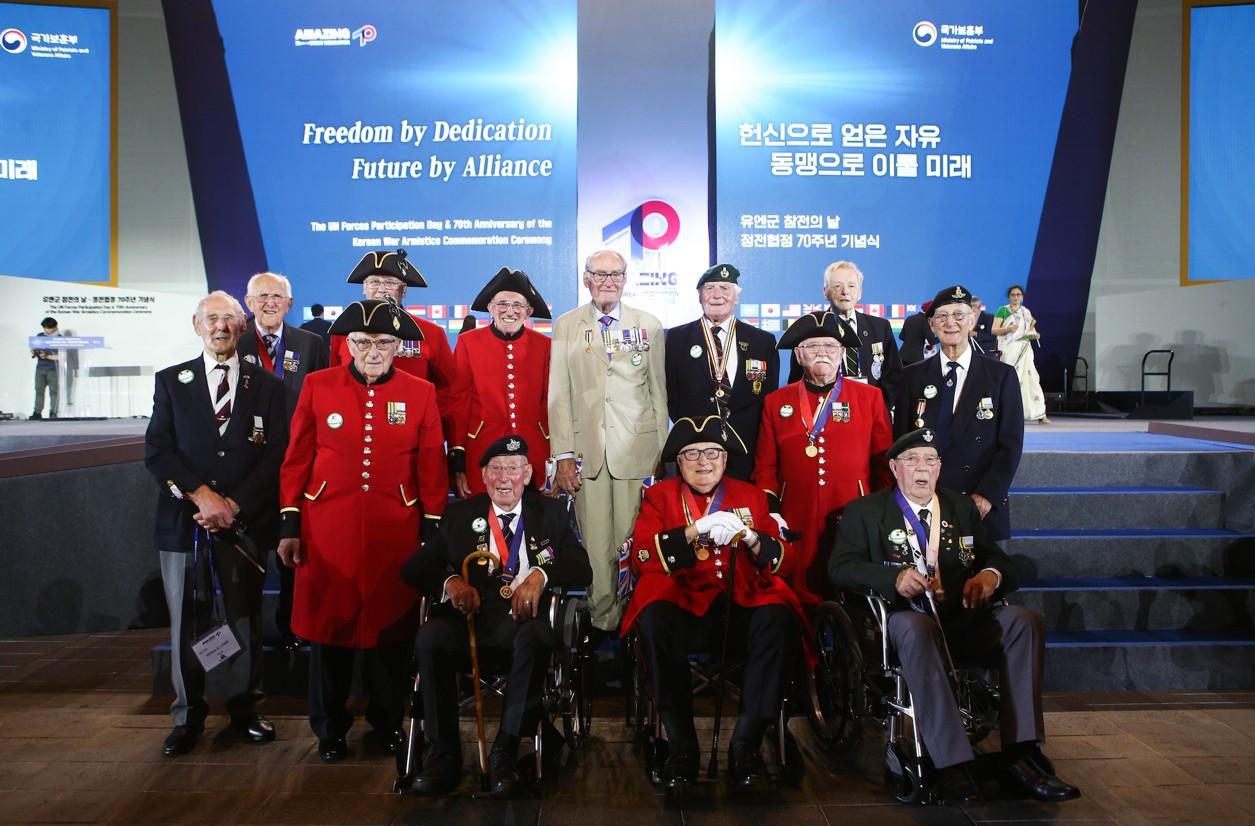
IP Roger Thompson, whose presence held a deeply personal meaning, embarked on this journey to commemorate his father's remarkable service throughout the war. As we would come to witness, his presence added an additional layer of remembrance.
The success of this journey would not have been possible without the tireless efforts of the accompanying staff members. The lead staff member Major (Retd) Frankie Howell CofIs, along with Tracey Summers and Bobette Blake, highly experienced nurses who provided care and support to the in-pensioners and other veterans throughout the trip. Their presence was an invaluable contribution, providing medical attention, and compassionate support whenever it was needed.
We were fortunate to have the support and companionship of two Chelsea Pensioner family members who joined us on the trip. Jo Simms, the devoted friend of IP Colin Thackery, and David John, the son of IP Trevor John, were invaluable additions to our team. They played vital roles in helping with the well-being, care, and accountability of the whole group when it was needed.
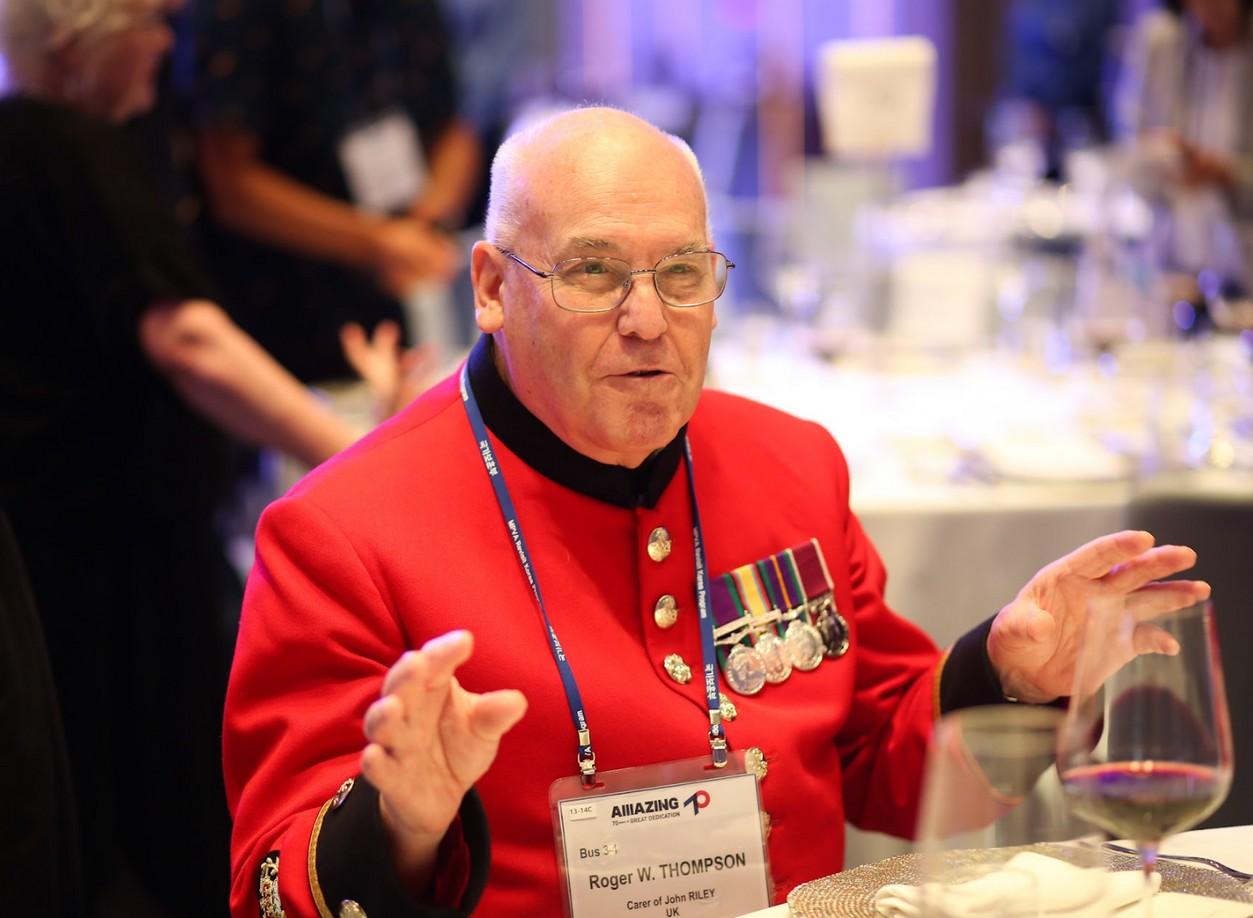
The journey to South Korea commenced with a twelve-hour flight on Korean Airways, with all the Korean War veterans comfortably seated in business class. This arrangement allowed them to rest and conserve their energy for the momentous six days ahead. Remarkably, the flights and accommodation were generously sponsored by the Korean government, a testament to their profound appreciation for the sacrifices made by these veterans decades ago.
We had the pleasure of witnessing a comedy moment that is bound to be remembered for a long time. The main character of this humorous episode was IP John Riley, and the central figure was his tricorne hat.
John decided to carry tricorne in a large, square box. As he approached the airport security checkin, the sight of the box aroused suspicion among the security personnel. Their training and vigilance prompted them to question John about the contents.
The situation quickly escalated as they delved into inquiries about the mysterious box. Tensions were heightened as they meticulously examined the contents. It was clear that the incident had the potential to create a minor security issue, and the atmosphere at the security checkpoint grew somewhat tense.
 IP Roger Thompson
IP Roger Thompson
However, in a delightful turn of events, John decided to defuse the situation with a touch of humour. After a brief pause, he removed the tricorne hat from the box and, without any hesitation, placed it on his head. The transformation from a seemingly suspicious box to an amusingly dressed John wearing a tricorne hat instantly lightened the mood. Laughter resonated through the check-in, and even the security personnel couldn't help but chuckle.

Upon arrival, the group received a heart-warming and extraordinary welcome from the Korean people, who deeply cherished the bravery and contributions of all those who had fought for their freedom during the Korean War. Embracing the warmth of the reception, the group made their way to their hotel, with excitement and anticipation building for the days of commemoration that lay ahead.
The second day of our journey began with a sense of camaraderie as we shared breakfast with veterans from all corners of the globe who had served in the Korean War. It was a poignant reminder of the shared sacrifices made by individuals from different nations.
 IP John Riley with his tricorne and straws in top left pocket for his Guinness
IP John Riley with his tricorne and straws in top left pocket for his Guinness
The Veteran’s Breakfast

After breakfast, we eagerly boarded coaches that would take us on a two-hour drive to Panmunjom, a place etched in history and a symbol of the Korean War's enduring legacy.
However, as we prepared to depart, there was a moment of uncertainty. News reached us that an American serviceman had absconded across the border crossing point of Panmunjom into North Korea. This development raised concerns and almost led to the cancellation of our visit. The safety and security of the veterans and the group were of paramount importance, and it was essential to reassess the situation carefully. Fortunately, after careful consideration and consultation with the authorities, it was decided that the trip would proceed as planned.
As the coaches rolled on, there was a mix of emotions among the Chelsea Pensioners and other veterans. The anticipation of visiting Panmunjom, combined with the awareness of the recent events, heightened the solemnity of the journey.
Upon arrival at Panmunjom, we were met with a powerful sight. This small village, straddling the border between North and South Korea, serves as the site of the Joint Security Area (JSA), where military and diplomatic discussions between the two nations have taken place. It is a place where history stands still, where the scars of the war are still visible, and where hopes for reconciliation and peace persist.
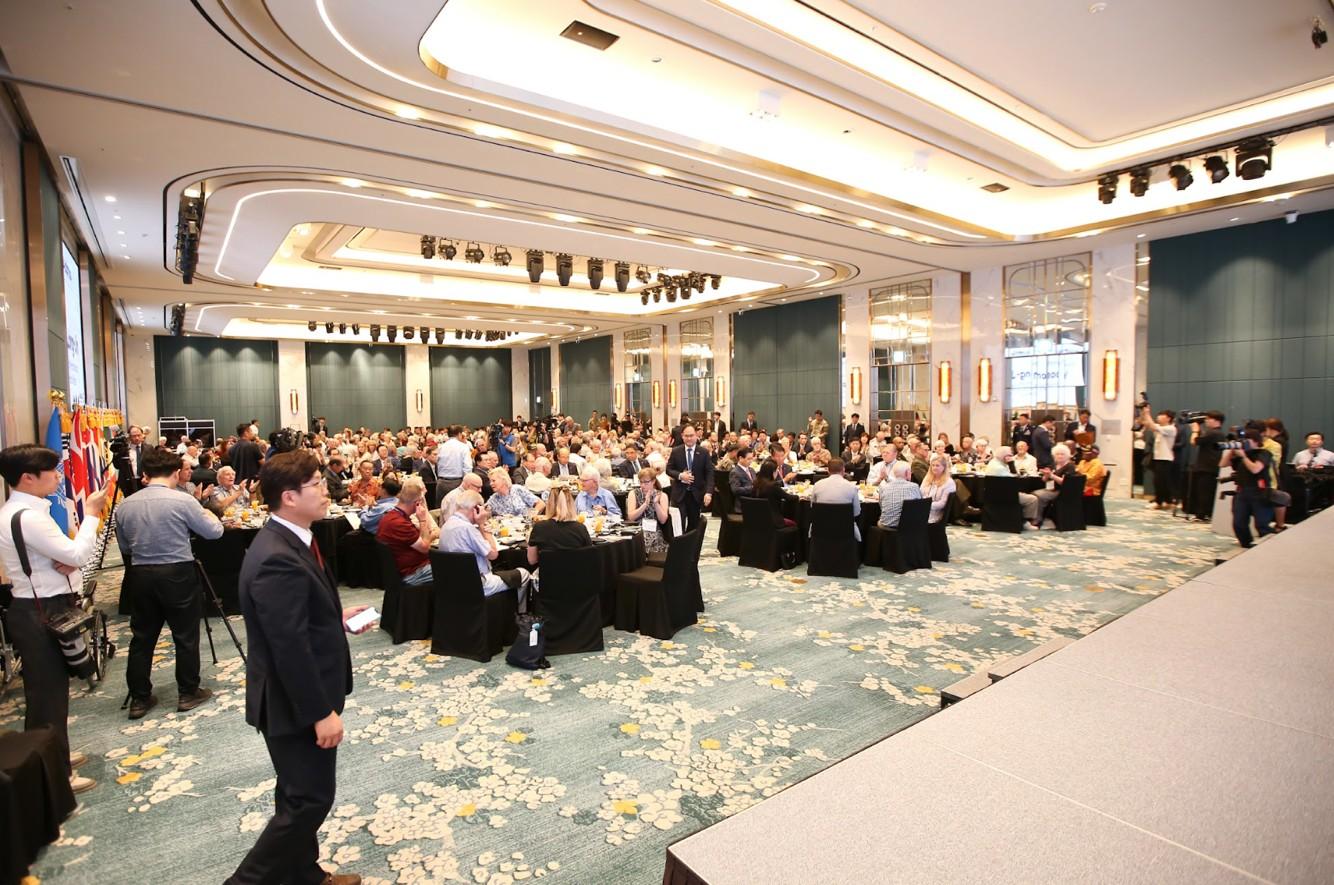
IP George Reed and Trevor John overlooked by North Korea


The visit to Panmunjom allowed the veterans to reflect on the immense significance of their service during the Korean War. They witnessed first-hand the enduring impact of the conflict and the ongoing efforts to maintain peace and stability on the Korean Peninsula. It was a poignant reminder that the sacrifices they made had lasting consequences, and their contributions would never be forgotten.
As the day drew to a close and the coaches made their way back, there was a shared sense of gratitude for the opportunity to visit Panmunjom. It was a day that reaffirmed the importance of commemorating history, embracing the present, and working towards a future free from conflict. The journey had only just begun, and there were more experiences and connections to be forged as we continued to commemorate the 70th anniversary of the Korean War in South Korea.
The Bullet Train to Busan


After bidding farewell to Seoul and embarking on a swift and awe-inspiring journey on the fastest train in the world, we arrived in the captivating city of Busan. As we gazed upon the city's vibrant atmosphere and the mesmerising coastal scenery, the spirit of South Korea's technological and engineering continued to impress us.
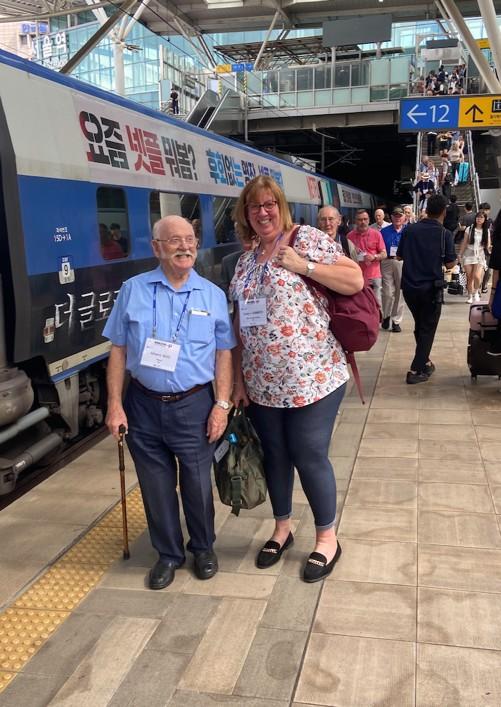
Settling into yet another wonderful hotel, we eagerly prepared for the highlight of the evening - a banquet that would bring together veterans from various nations, military Generals from Korea, the UK, and America, and esteemed Korean VIPs. The anticipation was palpable, knowing that this special occasion would be a night to honour and recognise the valiant heroes of the Korean War.
Entering the banquet hall, we were met with an atmosphere filled with warmth and camaraderie. Veterans from all walks of life exchanged stories and shared memories, forming new connections while cherishing the bond that comes from shared experiences during wartime. The collective history that united us surpassed language barriers and geographical distances, creating a profound sense of brotherhood among those who had once been separated by battle lines.
The highlight of the evening was undoubtedly the Medal ceremony that honoured the Korean Veterans for their bravery and sacrifices during the war. As each veteran was called forward, they were met with resounding applause and expressions of gratitude from all present. The medals
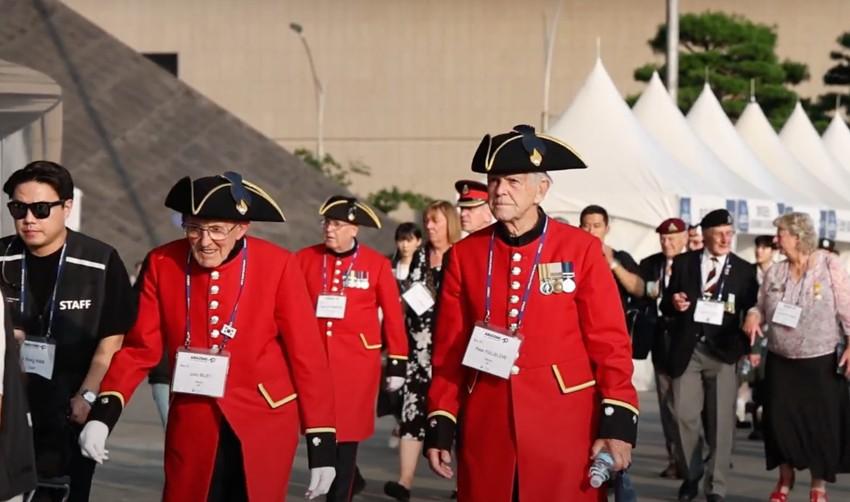 IP George Reed and Tracey Summers arriving in Busan
IP John Riley, Roger Thompson and Peter Fullelove arriving at Banquet.
IP George Reed and Tracey Summers arriving in Busan
IP John Riley, Roger Thompson and Peter Fullelove arriving at Banquet.
bestowed upon them symbolised not only recognition from the nation they had defended but also a heartfelt appreciation from the people of South Korea.

Among the veterans, IP Colin Thackery took centre stage, capturing the hearts of everyone present with his rendition of the Korean song Arirang. His performance resonated deeply with the audience, evoking emotions. As he sang, the room fell silent, and the power of his music carried us through a journey of remembrance and nostalgia. His talent and presence truly made him the star of the night, and the appreciation showered upon him was a testament to the enduring power of music in connecting hearts and bridging generations.
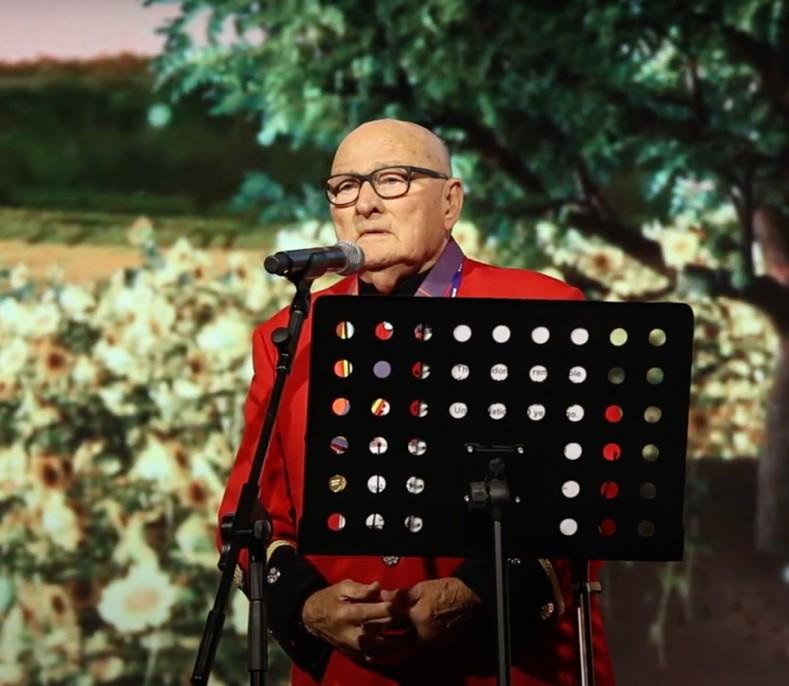
Throughout the banquet, stories were shared, laughter filled the air, and tears were shed as memories were revisited. The camaraderie that had been forged on the battlefield was reignited in this gathering of heroes, and the night became a living testament to the resilient spirit of those who had served during the Korean War.
As the evening drew to a close, we felt a profound sense of fulfilment and gratitude. The banquet had been a celebration of courage, resilience, and the enduring bonds of friendship. We departed with hearts full of appreciation for the warm welcome we had received in Busan.
IP Colin Thackery singing ArirangThe next stop in Busan was the UN Memorial Cemetery, a sacred ground where soldiers from 16 different countries rest in eternal peace. It was a place of remembrance and reflection, a tribute to the brave souls who had laid down their lives during the Korean War in the pursuit of peace and freedom. The serenity and solemnity of the cemetery were a poignant reminder of the sacrifices made by countless individuals from around the world.
For IP Trevor John, this visit held a deeply personal connection. As he wandered among the rows of gravestones, a profound moment unfolded when he came face to face with the grave of his fallen friend, Private G. P. Goldfield. Private Goldfield had been a dear companion, and he had made the ultimate sacrifice, losing his life next to Trevor in No Man's Land at the tender age of 19. The weight of the memories washed over IP Trevor, evoking the pain and sorrow of losing a comrade, a friend, and a brother in arms.
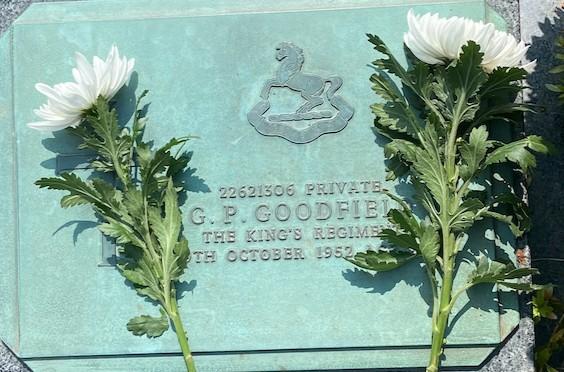

IP Trevor John and Son David paying tribute to his friend Kingsman Goodfield
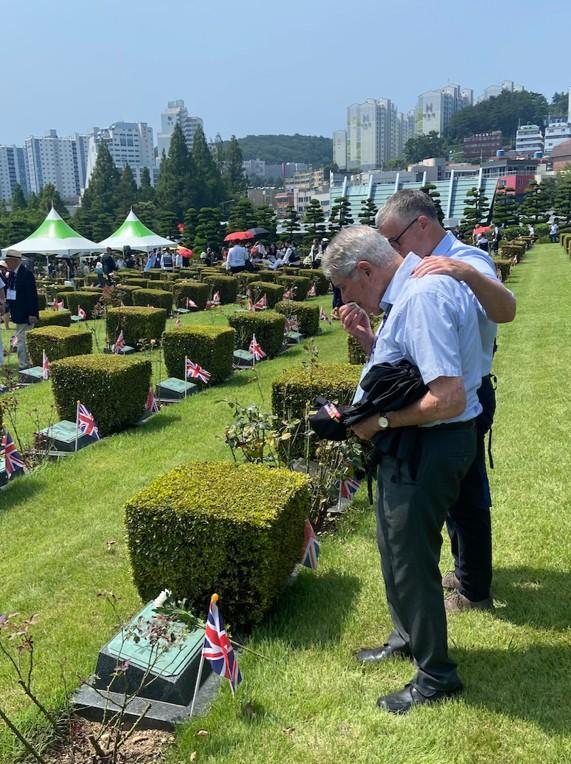
In this moment of raw emotion, Trevor's son, David, offered unwavering comfort and support. As father and son stood together, the bond they shared transcended time and space. It was revealed that Private Goldfield had shielded Trevor from the blast of a mortar round, an act that had saved Trevor's life at the cost of his own.
In that solemn instant, the complexities of wartime camaraderie and sacrifice came full circle. The legacy of friendship, loyalty, and courage shone brightly, leaving an indelible mark on both father and son. The visit to the UN Cemetery served as a poignant reminder that the sacrifices made during the Korean War were not just statistics or tales from the past - they were living memories, etched into the hearts of those who had experienced the horrors and bonds of war first-hand.

After finally discovering the resting place of his dear friend, IP Trevor John's journey led him to yet another solemn grave, that of his platoon commander, 2nd Lt. AJ McBride. The young officer had valiantly served but tragically lost his life in the line of duty at the tender age of 20. The weight of sorrow and nostalgia deepened as Trevor stood by the grave of his fallen leader.
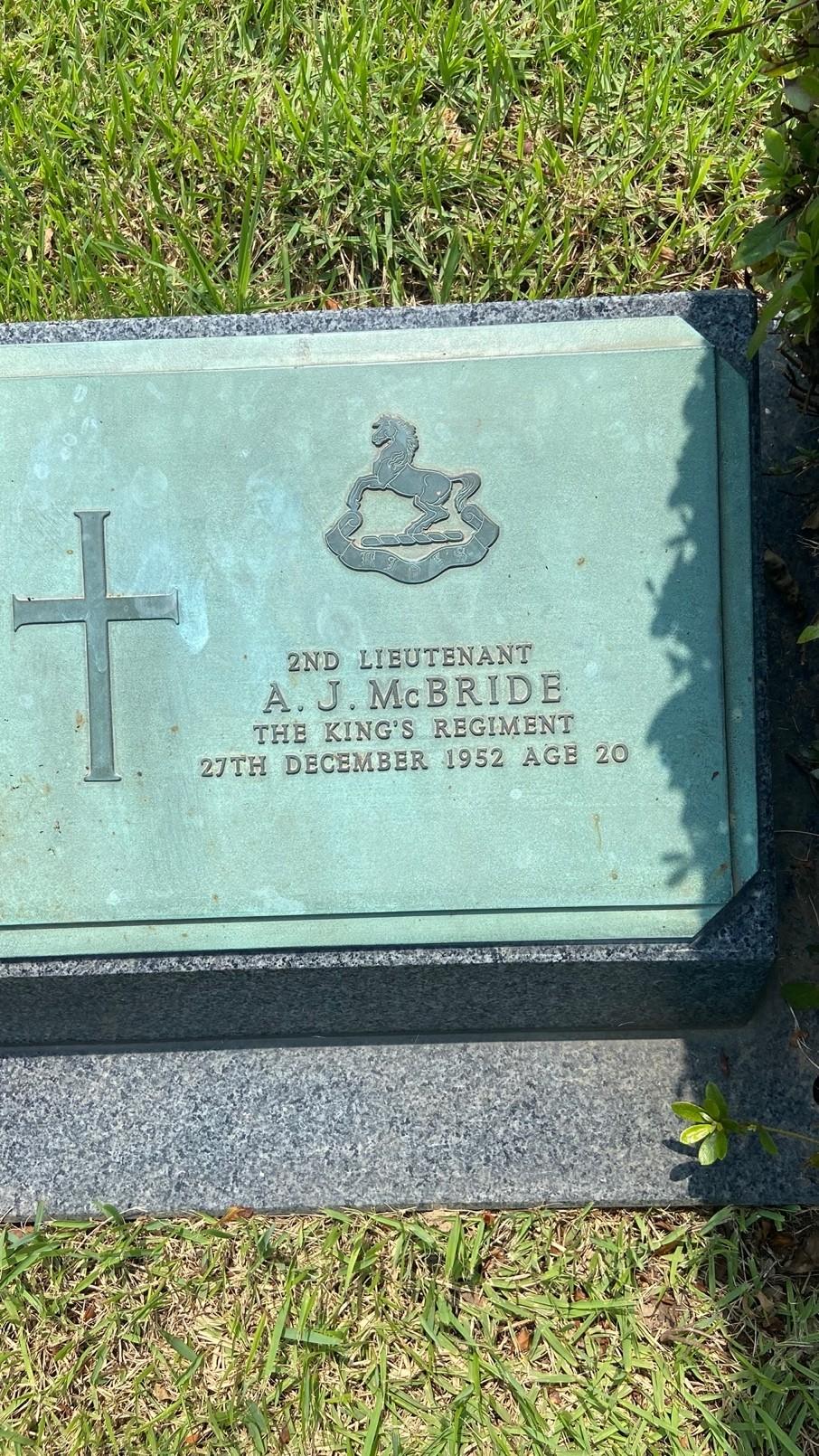
As we left the cemetery, the group fell silent, reflecting on the profound impact of the day's experience. The journey through South Korea had become more than just a commemoration; it had become a personal journey of remembrance, resilience, and the enduring spirit of those who had faced the ravages of war.
With heavy hearts but fortified spirits, we continued our journey back to our hotel for well-deserved rest before getting ready to depart for the main event, the UN Forces Participation ceremony with the Korean President in attendance.
In a small stadium, reminiscent of a scaled-down version of Wembley Stadium, a historic event unfolded under the scorching heat of 38 degrees. A momentous gathering that brought together dignitaries, military personnel, and esteemed guests from the United Kingdom and South Korea. The atmosphere was charged with formality, as all attendees donned their uniforms and elegant formal dresses.

Among the guests were senior military figures from the UK, including the Chief of the General Staff, General Patrick Sanders. Although honoured to be part of this momentous occasion, the unforgiving heat posed a challenge for the veterans and military personnel, who carried themselves with utmost composure and resilience.
The highlight of the ceremony was the heartwarming moment when each veteran was called onto the stage and personally greeted by the President of South Korea, Yoon Suk Yeol. This display of respect and appreciation for the veterans' service left an indelible mark on both the recipients and the audience.
A particularly touching and emotional part of the event was the performance of "Arirang," a poignant Korean song, by IP Colin Thackery. With a voice that resonated with deep emotion and sincerity, Colin's rendition of the beloved Korean song, yet again, struck a chord with all those present, transcending language barriers and cultural differences.
Accompanying Colin's soul-stirring performance was a choir of young Korean children dressed in their national attire. Their youthful voices blended harmoniously with the veteran's heartfelt performance, creating an atmosphere of unity and cultural exchange that touched the hearts of everyone in attendance.
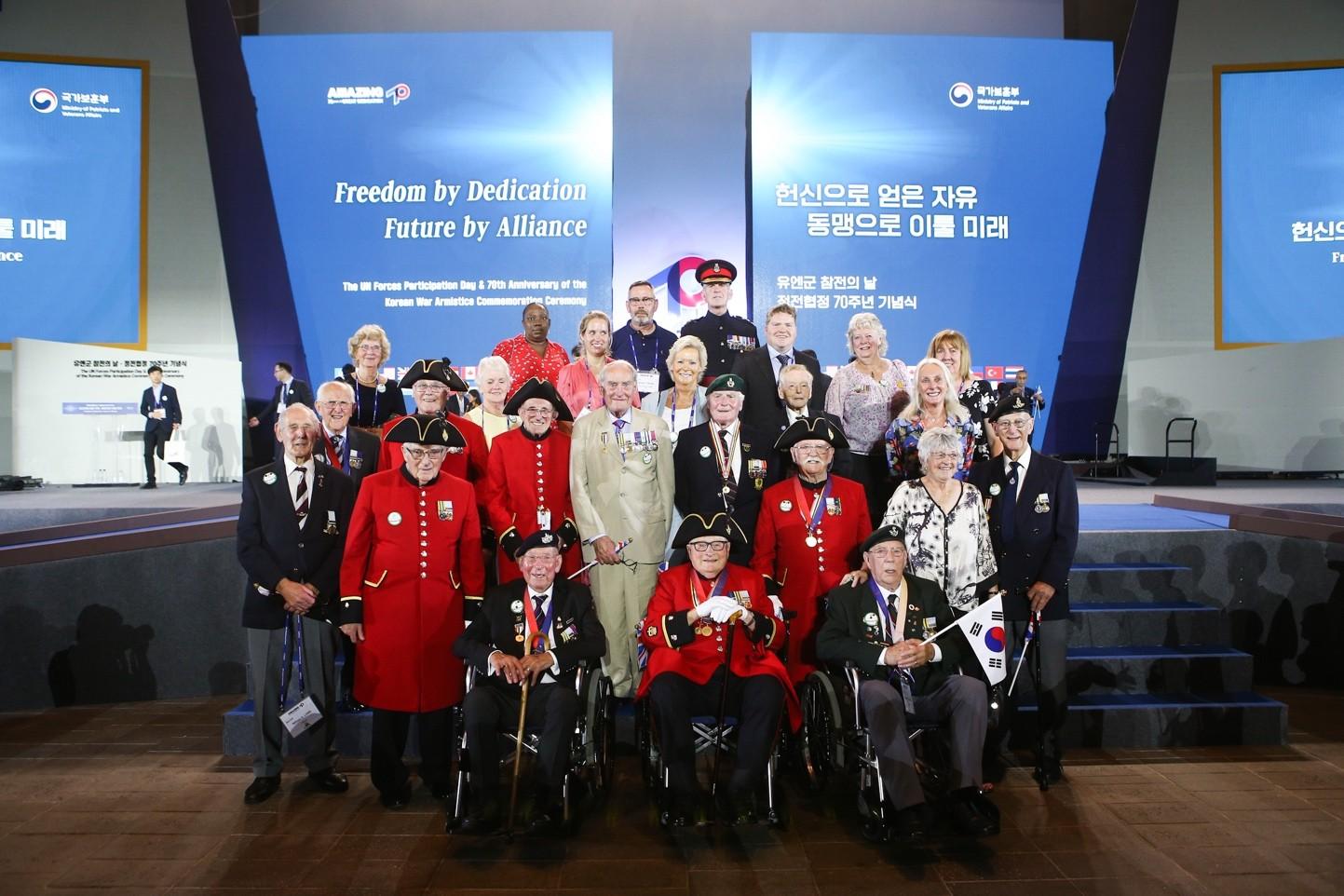
It was not merely a formal event, but an occasion that will be etched into the memories of all those present. The respect shown to the veterans, the expression of cultural heritage through music, and the camaraderie between all the nations made this ceremony truly unforgettable.
As the night drew to a close, the words of gratitude from both sides resounded throughout the stadium. The Korean President expressed his appreciation to the guests for their participation and the enduring alliance.

The next morning arrived, leaving us well-rested and ready to embark on our journey back to Seoul. With bags packed and hearts full of cherished experiences, we eagerly awaited to board the train that would carry us back to the bustling city.
Looking out of the wide windows, passengers were treated to breath-taking views of lush green fields, rolling hills, and quaint villages dotted along the landscape. The feeling of speed and smoothness combined through the picturesque countryside of South Korea was another experience we will all treasure.
The UK Veteran’s group following the Presidential CeremonyOn the fifth day we visited the Wall of Remembrance. The Wall of Remembrance is a solemn and inspiring monument that stands as a symbol of Korea's resilience and determination throughout its turbulent past. It is located in Seoul and serves as a stark reminder of the Korean War and the hardships the nation endured during that period. As we approached the site, a sense of reverence washed over us.
The first thing that caught our attention was the impressive size of the wall, stretching far beyond what our eyes could see. The structure was constructed with black granite, and etched upon it were the names of over 140,000 soldiers who lost their lives in the Korean War. Each name represented a story, a family, and a legacy that would forever be etched in the hearts of the Korean people.
As we moved closer, we noticed that visitors were leaving flowers and notes of gratitude at the base of the wall. The atmosphere was sombre, yet there was a sense of unity and patriotism among the visitors. It was evident that the Wall of Remembrance was not just a tourist attraction; it was a sacred place where Koreans came to pay their respects and remember the sacrifices made for their freedom and prosperity.
The adjacent Memorial Hall provided us with a deeper understanding of the war's impact on the nation. Inside, we found photographs, artifacts, and written accounts that told the harrowing stories of the war.
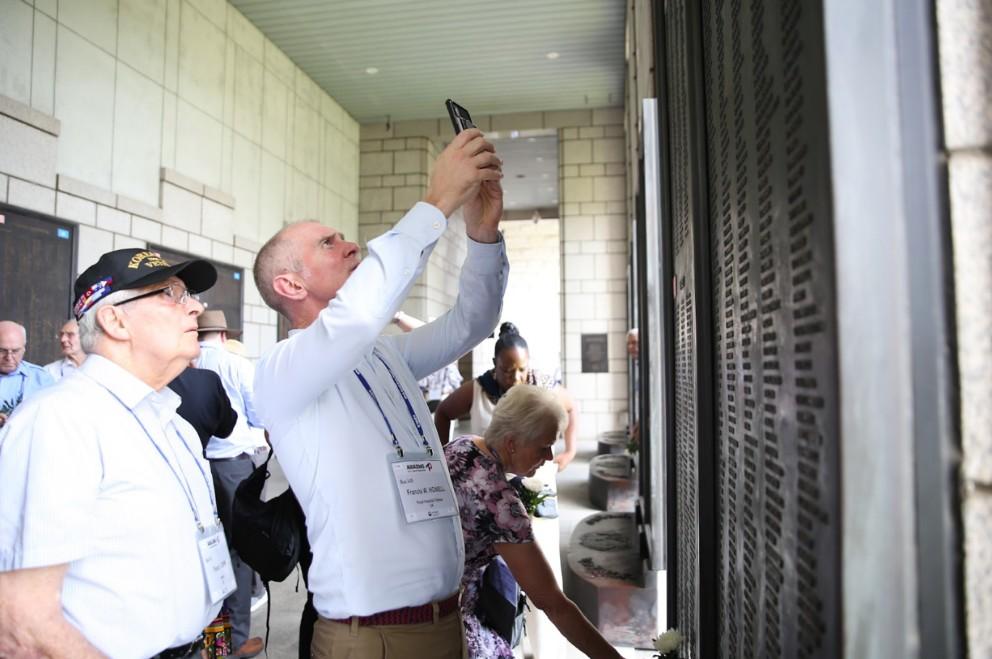
As we journeyed back to our accommodation, we couldn't help but reflect on the experiences of the day. The Wall of Remembrance had left an indelible mark in our minds, reminding us of the value of peace, freedom, and the courage of those who fought and died.
A Memorable Evening at the British Embassy in Seoul
As our stay in South Korea, ended, we were bestowed with a remarkable opportunity - an invitation to the British Embassy, hosted by none other than the British Ambassador, Colin Crooks. It promised to be a night to remember.
Upon arrival at the majestic embassy building, we were warmly welcomed by the diplomatic staff. As we stepped inside, we were immediately drawn to the elegant décor, a blend of British tradition. and contemporary design.

As the evening progressed, we were treated, yet again to a musical performance by IP Colin Thackery, adding a touch of entertainment and charm to the gathering. We had the privilege of presenting a special gift to the British Ambassador, the gesture was met with genuine appreciation. We departed with a sense of gratitude for the hospitality shown by the British Ambassador and his team.
Farewell Korea: A Journey to Remember
It was time for us to bid farewell to our Korean hosts and the other veterans from various countries who had become our comrades during this unforgettable journey. With heavy hearts and cherished memories, we boarded our flight, ready for the 12-hour journey back to the UK. The trip had been nothing short of extraordinary. The Wall of Remembrance, the bustling streets of Seoul, the rich cultural experiences, and the camaraderie with veterans from different corners of the globe – each moment etched into our memories.
As we settled into our seats, we couldn't help but reflect on the incredible experiences we had shared. The flight back to Heathrow seemed to pass in a blur, with some of us taking the opportunity to catch up on sleep.
As we touched down at Heathrow airport, exhaustion weighed heavily on our shoulders, but there was also a sense of fulfilment and satisfaction that came from having undertaken this journey. We had pushed ourselves to explore a different culture, to embrace new experiences, and to honour the sacrifices.
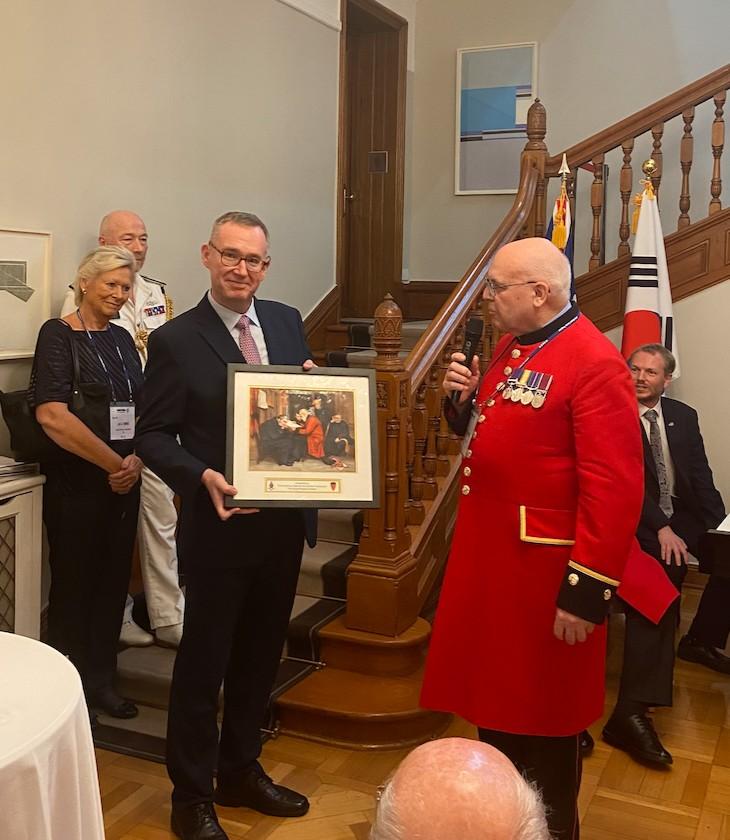
 IP Roger Thompson Presenting to The British Ambassador Colin Crooks
IP Roger Thompson Presenting to The British Ambassador Colin Crooks
War Diary of Trevor John:
Date: 19 October 1952 Location: No Man's Land, Korea
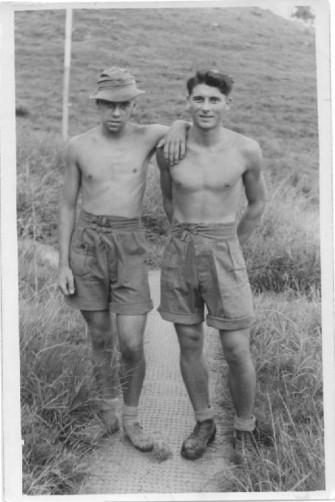
Born on 18th May 1931, I had enlisted in the British Army on 6th December 1951, joining the Welsh Regiment. However, I was later rebadged to the King's Regiment and found myself sailing towards Korea in July 1952, alongside my fellow comrades.
After a long and arduous journey, the King's Regiment arrived in Pusan in late August 1952. We wasted no time and moved forward into the line, prepared to relieve the Australian Regiment. Before entering the battlefield, we underwent rigorous training to ensure we were ready for the challenges that awaited us. This included hand grenade training that should have happened in the UK.
On the 19th of October 1952, HQ issued orders for our company, A Company, to move into no man's land. We were to move past the two other companies. As a private soldier, I harboured doubts about the decision to carry out the manoeuvre during daylight. In my humble opinion, utilizing the cover of darkness would provide us with a higher chance of success. I voiced my concerns to my sergeant, suggesting that we wait until nightfall, but my words fell on deaf ears. He ordered me to be quiet and insisted that we proceed immediately.
Filled with a sense of foreboding, I followed my comrades into the treacherous no man's land. The moment we crossed into that barren expanse; all hell broke loose. Mortars rained down upon us, initially landing slightly short of our position.
The enemy soon got their bearings and fixed their mortars on us. I remember turning once the order to retreat was given, but that is all I can recall. I was seriously injured, as were three of my friends. My number one on the Bren gun Kingsman Goodfield was killed. I was evacuated to a tented hospital behind the lines. I was then flown by the Australian Airforce to Kure, Japan for rehabilitation.
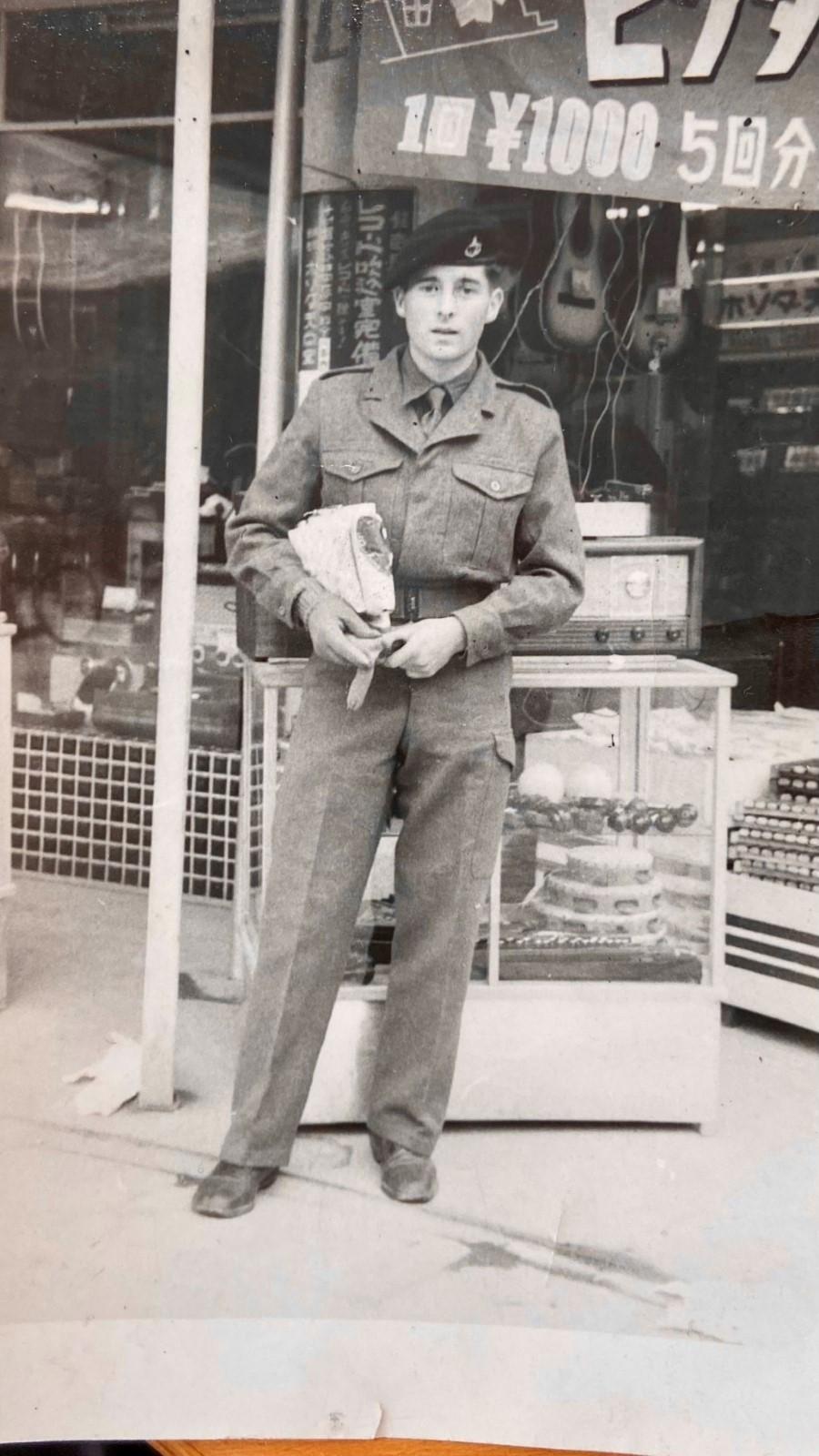 Trevor John on the day he was released from Hospital.
Trevor John on the day he was released from Hospital.
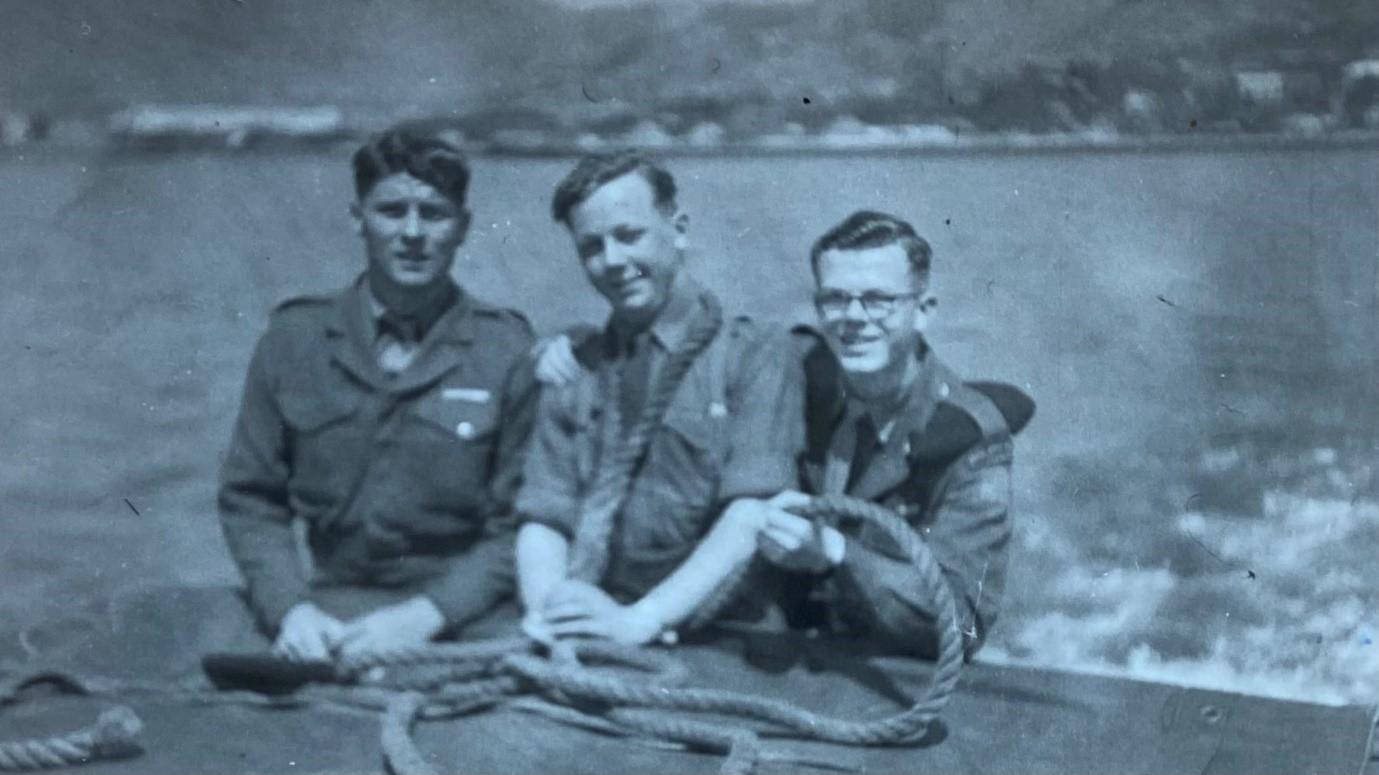
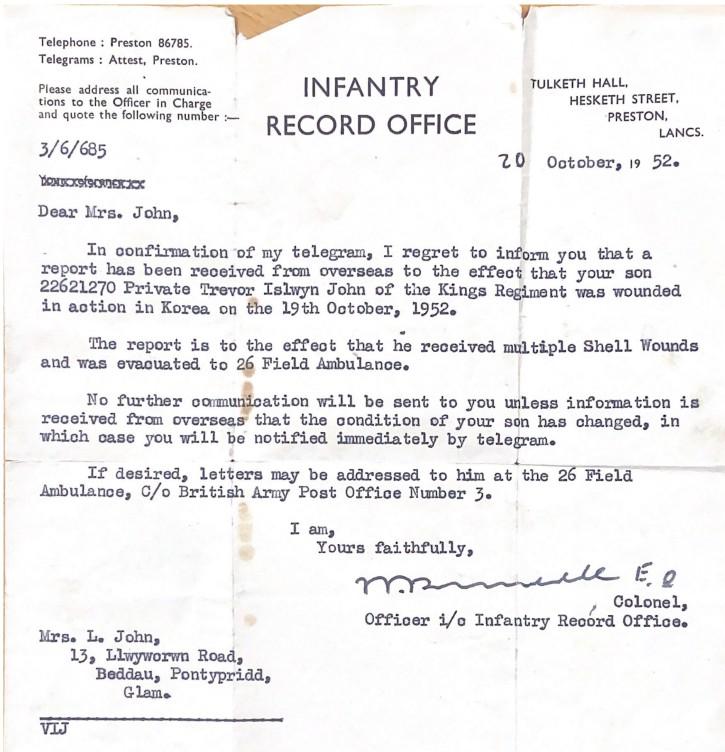 Trevor John (Left) enjoying rest and recouperation.
Trevor John (Left) enjoying rest and recouperation.
Contribution to the reconstruction of Korea
Deployment: May 1954
I was as a Royal Engineer part of the United Nations during the reconstruction of Korea following the war. I boarded the troop ship ‘Empire Fowey’ in Southampton, along with my comrades, prepared for the challenges that lay ahead. The voyage was anything but smooth, especially when we crossed the Arabian Sea. Seasickness plagued many of us, but we soldiered on. After a long and arduous journey, we finally arrived in Korea in June 1954. As we disembarked, I was greeted by the uplifting sound of an American band playing "When the Saints Come Marching In." It was a heart-warming gesture that brought a glimmer of hope amidst the uncertainty of what lay ahead.
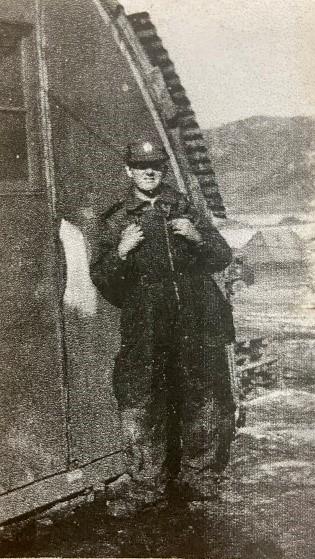
My skills as a constructional engineer were put to good use when I was assigned to build an observation tower near the Imjin River. The project began in the summer, and we persevered through scorching heat and challenging terrain. However, as the seasons changed, the extreme cold made our work even more difficult. Nonetheless, I found satisfaction in contributing to the reconstruction efforts and helping to build the infrastructure of this war-torn land. Unfortunately, our squadron suffered casualties. We lost one of our own in a terrible accident during the reconstruction. The memory of that event will forever be etched in my mind. It serves as a reminder of the dangers we faced, and the sacrifices made in the pursuit of rebuilding and peace.
In addition to our reconstruction tasks, my squadron was also involved in preparing bridges for demolition in case of future conflict. It was a sombre duty, knowing that the structures we worked so hard to build might one day be destroyed again. Nonetheless, we carried out our tasks diligently, aware of the importance of being prepared for any eventuality. With my reconstruction tasks complete, I volunteered to take on a new role as an intelligence clerk. My responsibilities involved marking dangerous mined areas on maps, providing vital
IP George Reed Korea 1954 Chelsea Pensioner George Reedinformation to those who needed it. It was a different kind of contribution, but I felt honoured to play a part in safeguarding the lives of our fellow soldiers. As I look back on my time in Korea, I can't help but feel an overwhelming sense of pride. The work we did, rebuilding the infrastructure and contributing to the recovery of this war-torn nation, fills me with a deep satisfaction. Seeing what Korea has become today, a thriving country, only strengthens my conviction that our efforts were not in vain. I am grateful to have been a part of this noble mission, and I will forever carry the memories of my time in Korea with me.
Colin Thackery War Diary
My name is Colin Thackery and I enlisted into the Royal Artillery aged 15 in 1946. My first overseas posting ended in Malaya. Back in the UK in 1949, I was posted to County Durham to 45th Field Regiment where I met my future wife. We were married on embarkation leave and two weeks later, I found myself on a troop ship heading for the Korean war.

After a long and eventful voyage on a troop ship, we landed in Suwon, Korea. The sight of the American Army band welcoming us on the quayside was both heart-warming and surreal. From there, we embarked on a train, destination unknown. After a five-day journey, we finally arrived in Suwon.
Upon our arrival, we discovered that our guns had not yet arrived, so we were assigned to antiterrorist operations. It was during one of these operations that I experienced my first taste of combat. We encountered men who were using innocent women and children at gunpoint to aid their infiltration. It was a chilling sight, and we had to take immediate action to protect the innocent.
One of the most significant battles I took part in was the assault on Hill 327. This hill stood 327 meters above sea level and was a strategic point of interest. In my role as part of the Observation Party of A Troop, I assisted the OP Officer in his duties. When we reached the base of the mountain, it was a dark night, and we were instructed to wait while the officer contacted the Commander of the Gloucestershire Regiment, whom our battery supported.
As we stood there in the darkness, a sudden and tremendous explosion shook the ground beneath us. The blast was so powerful that it blew us off our feet and left our ears ringing. To our disbelief, we realised we had been standing directly under the muzzle of a 20pr Centurion Tank gun. The ringing in my ears persisted long after the incident, resulting in significant deafness that I still suffer from to this day.
Despite the initial shock, we managed to rally and ascend the hill. I was assigned to man a trench equipped with headsets to report any activity over the radio. During that night, I relieved my officer and was approached by a member of the OP party who handed me a mug of tea and curiously asked about my friend. Bewildered, I turned to look and discovered that "my friend" was a Chinese soldier who had frozen to death due to the extreme temperatures that could reach as low as -40°C with the wind chill factor. It was a stark reminder of the harsh realities of war.
In another battle, I found myself in a trench at the top of a mountain. The frigid temperatures caused me to lose feeling in my legs and feet. To combat the numbness, I paced up and down the
2-meter trench, enduring the pain as circulation gradually returned. Little did I know at the time that this would lead to the diagnosis of lymphoedema, a condition that resulted from frostbite.
After eight months of intense action, I was granted a well-deserved four-day R&R period in Tokyo. It was a welcome respite from the chaos of war. However, our return to action was imminent, and we continued our duties until early 1952.
Though I did not participate in the actual Imjin battle, as I was sent back to retrieve fully charged batteries for the radio sets, I received shocking news from the Military Police. They informed me that the Gloucestershire Regiment had been surrounded, and I could go no further. I had no choice but to return to the battery lines, filled with a sense of concern for my comrades.
Shortly after this incident, we received new orders. Instead of returning home to the UK, we were redirected to Hong Kong. The constant movement and shifting circumstances have become the norm in this war. At some point during our operations, I was called back to the Regimental lines with an extraordinary task. We were chosen to provide a guard of honour for the reopening of the British Embassy in Seoul.
The attached photo captures me playing a cavalry trumpet on this important occasion. My skills on the trumpet and bugle were also utilised to confuse the enemy. I had been ordered to Battalion Headquarters to meet the Drum Major and learn their calls on a captured bugle.
War brings both moments of triumph and heart-wrenching loss. As I reflect on my experiences, I am reminded of the tremendous sacrifices made by soldiers on both sides. The deafening explosions, the bitter cold, and the comrades lost along the way are etched into my memory.
Royal Engineer during the United Nations Rebuild 1954

Departure from Liverpool on the Empire Orwell ship was a memorable experience. The accommodations on G deck, below sea level, were far from pleasant. We all suffered from terrible sea sickness, and the cramped canvas beds made for uncomfortable and noisy nights. During our voyage, we made a stop at Egypt. I vividly remember the joy on the faces of the young children as we threw coins for them. It was heart-warming to see their smiles amid the chaos. Afterward, we sailed to Kuri battle school in Japan to receive our equipment before continuing to Korea.
Upon arriving in Pusan, Korea, I was greeted by the biting cold. We were issued extra equipment to keep us warm, including the infamous "Cobbly Wobblys," the cold wet weather boots that became a staple of our uniform. Our living conditions consisted of 8-man tents equipped with diesel heaters. However, these tents were always filled with black smoke, and our nostrils constantly bore the evidence. Sadly, we experienced tent fires on numerous occasions, which posed a great risk to us all.
Tragedy struck when we lost one of our team members in a truck accident during the reconstruction efforts. His nickname was 'Scouse,' and his absence will forever be felt. We mourn his loss and cherish the memories we shared with him.
As a qualified plumber, I actively participated in work parties tasked with building shower units and handling any other plumbing requirements. I also played a role in road and drainage ditch construction. However, what fills me with the greatest pride is my involvement in water purification for both the troops and the civilian population. Water was a precious resource in those times, and our team worked diligently to ensure its delivery to those in need. It feels immensely fulfilling to have played a part in such a vital service.
Reflecting on my time here, I am overwhelmed with pride to have been part of the rebuilding process in Korea. This country, once devastated by war, is slowly but surely transforming into a remarkable nation. I eagerly anticipate the day when I can return to Korea and witness first-hand the fruits of our labour, experiencing the beauty of this remarkable country at its finest. Until then, I shall continue to dedicate myself to this noble cause and carry out my duties as a Chelsea Pensioner with unwavering determination.
